#.// apropos of nothing have a personal tale
Text
I uhhhhhh I'm gonna start watching Black Sails finally
edit: this means more saily art of Arthur will occur. he's my main and I cannot change this, y'all have been warned. I may doodle characters that leave strong impressions--whether or not they turn out good will determine if y'all ever see them.
11 notes
·
View notes
Note
Hiii! This question is kinda apropos of nothing but I’m curious: who is the person in your profile pic? Every time I scroll past it a little too fast I think it’s Alan Alda/Hawkeye haha
no worries (i think alan alda would be honoured, if i remember correctly, he mentioned meeting him once as a kid in his memoir). it's this fellow:
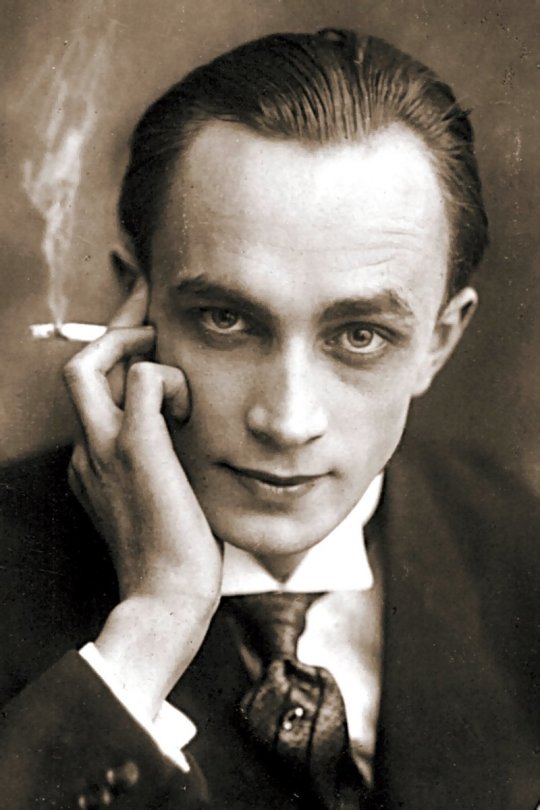

his name was conrad veidt, a famous german actor of the weimar republic, later escaped to britain and then the us to get away from the nazis with his jewish wife, Ilona Prager. he also starred in two pro-jewish films shortly after the nazis came to power in 1933 (the wandering jew, and jew süss, but i confess i haven't watched these yet, so i cannot say how well they aged) -- generally did a few films that were about Social Issues that came down on the side of the oppressed, including the woman's crusade, and the merry-go-round, as well as... (see below)
famous for some very important movies:
1. played the lead in the first movie to openly portray gay men (anders als die andern), which was produced by magnus hirschfeld and the institute of sexology in a bid to get support for legalising homosexuality -- it's free on youtube! also 105 years old, can you believe...
2. played the somnambulist in the cabinet of dr caligari, and generally was every vamp-girls/boys dream back in the day, playing in a lot of the german expressionist films and proto-horror films, and generally not afraid to play offbeat, uncomfortable roles that weren't about being an attractive leading man (eerie tales, the hands of orlac, waxworks, the man who laughs)
3. after he moved to the us, he was very happy to portray nazis to give them realism, and he plays major heinrich strasser in casablanca in 1942 (his second-last film)
i believe he was in a total of 115 films, but quite a few of them between when he started in 1917 and 1930 are lost (der januskopf, i think of you often....murnau, bela lugosi, and conrad veidt, in an adaptation of jekyll and hyde??? arghhh)
other fun facts, did occasionally crossdress and in fact this may have contributed a little to his first divorce, as his wife found him and a bunch of his friends wearing dresses one night after she came back from work -- notably conrad was in her new dress. she told a friend that this was the breaking point, but it may have partially been a joke. they did divorce though
was also at one point called the prettiest girl in berlin in print, good for him
was probably bisexual, although having said that i've actually never read why people think this -- so for now, he was a mensch and a great ally to a lot of people, a little on the queerer side in all things
i do follow a fair few conrad veidt blogs on here, but i don't talk about him often, it's one of those "am a fan, but keeping it mostly to the chest" kind of things with him -- however, as you can tell, very happy to give the Info when asked!
that's the man, the girl, the pretty boy: mr conrad veidt!
#conrad veidt#really i ought to get a book on him to fill in the gaps in my knowledge#a lot of the time im happy to just chill with what i know and different articles but.. i like a good book#weimar republic#weimar berlin#anders als die andern#queer history#queer cinema#cabinet of dr caligari#casablanca
15 notes
·
View notes
Text
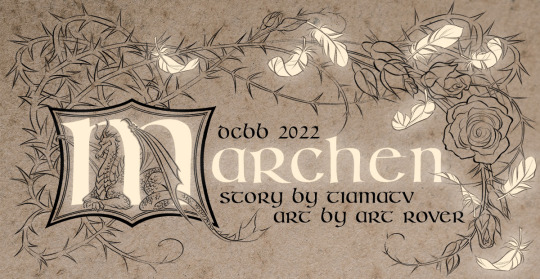
Title: Marchen
Author: tiamatv
Artist: art-rover
Rating: Mature
Pairings: Dean/Castiel; Dean/Others (background); Charlie/Gilda (background); Michael/Adam (background)
Length: 50000
Warnings: Some graphic gore/violence, depression, minor character death
Tags: Alternate Universe - Fairy Tale; Alternate Universe - Fantasy; Curses; Dragons; Monsters; Carnivorous Hedges; Dating but Don't Know It; Shipper!Charlie; Third Person Omniscient
Posting Date: November 2, 2022
Summary: Once upon a time, there was a green-eyed prince, locked away in a tower of monsters for the sin of refusing his angelic betrothed.
Once upon a time, there was a blue-eyed wizard who had erred, and in doing so had lost, and lost, and lost, until he had little left to lose.
Once upon a time, there was a Princess of Mondoor, cursed to live as a red dragon. Or perhaps she was a red dragon who had been born in the shape of a Princess of Mondoor. Hard to say. Anyway, she was definitely a dragon now.
These were all separate stories.
Until they weren’t.
Excerpt: “So you can’t just be… rescued?” Garth repeated. “Whaaaaaat? You’ve got to, like, fall in love with someone and they’ve got to fall in love with you?”
“Yep,” Dean answered, popping the ‘p’.
“It’s crazy smart magic,” Charlie admitted. “Making it conditional like that, having the tower’s magic tied to all of it… magic’s all about potential, right? And the curse draws from the potential of that rather than from the caster. And with every year that passes, that potential just gets stronger and stronger. Even with angel magic being all weird and broken now.”
Dean glared at her.
Which, sure, wasn’t exactly going to do much—considering that she was forty feet long, it was possible that if he stabbed her it might not do much other than pinch her a little—but it was the principle of the thing.
“I didn’t say it wasn’t an asshole thing to do!” she insisted, a little sheepishly. “Just that it, was, y’know. Smart.”
Dean kept glaring. Now Garth was glaring too, in solidarity, though it wasn’t even that much of a glare, compared to Dean’s.
“Yeah, yeah,” Charlie muttered, and tucked her nose into the broad arc of one red foreleg.
Humans. Just couldn’t appreciate a really well-crafted spell if it bit them in the… well, anyway.
“But how’re you supposed to do that, y’know, meet someone nice, fall in love with them, if folk only come thinking they’re going to be fighting their way up, or, y’know, rescuing you for that nice prize that’s being offered, or… oh. Ohhh. That’s why it’s a curse,” Garth muttered.
Dean didn’t bother to say “Yep” again.
Garth looked at him with his jaw squared (as much as he was able) and a serious expression (again, as much as he was able). “But you seem like a good guy,” he said, making Dean blink. “Really good-looking, too. And a prince, at that!” he explained, waving a hand to indicate up and down Dean’s long, lean body. “I bet you even have all your teeth!”
“Uhh…” Dean started, bewildered.
“Teeth are important,” Garth added, apropos of nothing at all.
“Teeth are weird,” Charlie agreed cheerfully. “Dragons shed them all the time. They just grow back in. Really freaked me out the first time I spat out a mouthful!”
“Really?” Garth asked, interested, leaning in as if Charlie’s maw weren’t big enough to swallow his head in one gulp. “Can I—”
“Guys. Focus.”
“Right, right.” Garth leaned back with a rattle of his armor. “Well, I’m real sorry I can’t fall in love with you. Just, I’m already taken.” He puffed his chest out proudly, visible even through his breastplate.
Dean thought his own tongue was so far in his cheek he might never be able to get it out as he mumbled, “Uh, yeah, well. Thanks anyway.”
DCBB 2022 Posting Schedule
66 notes
·
View notes
Text
[The following is not an essay. It is the author's attempt to grapple with the despair at losing something important to him, presented in hopes someone in a similar situation may know such things are worth grappling with.]
Apropos of Doctor Who's triumphant return to having writing and direction I can actually care about again, I've been reflecting on how much casual 'Moffat-hate' irritates me.
Obviously, I need to unpack that a bit.
I'm talking about the reflexive antagonism towards Steven Moffat's era as show-runner, writing tics, writing in general, moment of centrality to British TV and so on that I am no doubt going to run into if I go anywhere near Doctor Who reviews and analysis again. A sneer about perceived sneering here, another repetition of a narrative-construction gripe there. The regurgitation of old arguments because there is a strong contingent of people who loathe that era and Moffat in general, who have every right to that opinion, and who can quite reasonably bring it up when talking about Russel T Davies' new, second era of running the show, however that shakes out.
The me-problem here is, I loved a lot of 'the Moffat era' of Doctor Who when it was being broadcast. For whatever reason, it hit lots of nice buttons in my head and I had a grand old time watching it unfold. The 11th and 12th Doctors provided some really excellent examples of the show doing its best at what it does best. Indeed, 'Listen' may be my favourite example of a story delving into what Doctor Who is all about, ever.
But there is a degree to which my enjoyment is now perpetually enmeshed in defensiveness. Because the fandom was/is wild tangle of very strong opinions, much of them to the contrary, and that isn't likely to change any time soon.
[And for me personally, my best friend hates that era, which threw into sharp relief a lot of hang-ups I have around needing to justify the things I like. Having an emotional breakdown kind of sharp relief. That's not the sort of thing you just shrug off, even after all this time.]
To be clear, I am not here to defend Steven Moffat. I do not give a rat's arse about Sherlock – it was enjoyable at the time but I can't say it registered beyond 'a thing it was fun to watch once' – and I actively despise Twice Upon A Time, the last 12th Doctor story, for pretty much the exact reasons I think most people rag on Moffat's other work. It is a story ostensibly in conversation with a piece of source material that instead only concerns itself with the refracted, pop-cultural version of said thing, for the sake of being constructed like a joke.
Which in general is an approach far better suited to Doctor Who – a series progressively layering 'canon' atop stories that could not be recalled as anything other than half-remembered versions of themselves for a very long time – than it would ever be for something like Sherlock Holmes. Even if I didn't like Twice Upon A Time, I can at least forgive it as a wider pattern and oh for goodness sake, I've started defending the man anyway, haven't I?
You see the problem. I can't make a critique with any teeth because I am braced for the whole to be dismissed even as I home in on the specific part I wish to unpack. Must I defend a writer in toto because I vibed with one piece of their corpus? I don't think I would for anyone else and yet here we are. This is probably why I count myself lucky to have never been deeply invested in Doctor Who fandom in the communal sense, online or off. This and the people who fawn over the racist giant rat story.
[Talons of Weng-Chiang is a Yellow Peril tale, straight up, nothing else. It also jobs Leela, rendering her forever 'the savage' despite the entire point of her introduction being a rejection of the superstitions imposed on her people and thereafter proving herself extremely capable in new and strange situations. It was also written in Britain in the 70s so this is almost self-explanatory. Just fucking own the fact you enjoy the production values and excellent cast while accepting it's indefensible to claim this is the best the classic series produced, you chronic dipsticks.]
See, I can do it with other examples of what I dislike, bare my teeth and go for the throat. But few people argue we should write off Robert Holmes' extensive contribution to the series because he did a massive racism on account of being a British writer in the 70s. Maybe they should. I don't know.
What I do know is, I understand why the 11th and 12th Doctor eras work for me. I am a white cis man who thought he was straight when they started airing and who is exactly the kind of Doctor Who fan who'd want to solve the regeneration limit with a Five Doctors reference. I never felt like Moffat's grand arcs were talking down to me because, I suspect, I was the kind of person most easily able to imagine I was in on the joke by the end. Then again, the writer who's done some of the most extensive analysis and defence of this era is a trans American woman, whose work did more for my appreciation of Doctor Who history than anyone else. So – yeah.
When I said 'irritate', I meant exactly that. This whole topic is a burr, making it difficult to revisit things I once enjoyed. Maybe this would be the case anyway. I have grown a lot since then. So did Steven Moffat, over the course of writing more Doctor Who than any other person ever. He gave us gender-flipping regeneration, tried colour-blind casting and when it failed to make a difference, specifically cast for a black lesbian. And he revisited Donna's ending with an eye on querying the moral failure of it long before RTD2 wrapped around to the same point. Why should I look kinder on his predecessor, who presided over the abusive shit-show that was the production of the 2005 revival season and yet gets to come back to save the programme again?
Oh, yes. The writing. But Russel T Davies annoys me just as much in some places as Moffat does other people. So it goes. Although I suppose Moffat did hire Toby Whithouse to write the central part of Bill's arc and it was a chauvinistic wet fart because it was Toby Whithouse. He also worked for ages with Mark Gattis, whose writing I could shred on similar grounds. And around and around we go, sniping and arguing which of the middle-aged British guys tried their best, or wrote the worst.
[I am still mourning what Chris Chibnall's era of Doctor Who turned out to be. I was so hyped for getting Jodi Whittaker as the Doctor and then we hit Kerblam! and the oldest, most foundational piece of my inner cultural map no longer felt like something I wanted to be a part of. So yeah, he's the worst, for allowing that story to go out, 'the system isn't the problem, it's the people' and all. That's my 'hot-take', years too late. The man wasted dozens of excellent, interesting, diverse writers and actors on what is ultimately, in my opinion, the most mediocre crap since the Saward Era and his big contribution to the series going forward is to fanwank in an explanation for the Morbius!Doctors that essentially makes the Doctor the specialest special whoever specialed.]
At least Moffat previously made some attempt to spork the god!Doctor approach, before deciding they should textually be the reason evil doesn't triumph in the universe. Sadly, that endpoint seems inevitable. We're long past the days of the Doctor being a university drop-out, bumbling around the universe, interfering from the edges. Pick your saccharine alternative, I guess.
What was I talking about before I dived into my own bitterness and angry fan-ranting? How much people deriding one sitcom writer for his faults and prominence within a particular era of big British TV that sparked vast swathes of internet discourse continues to be an aspect of Doctor Who meta? How that makes me feel? Hah. Who cares?
There's no widely applicable point here, just an emotional sore making me wonder if I'm ready to 'get back into' Doctor Who. Because yes, actively being revolted by the Chibnall Era is the real reason I fell out with the show. And yes, maybe I've just grown beyond the point where Doctor Who satisfies, full-stop (let's leave the political rant about The Zygon Inversion for another time; I'll only be repeating other people). But sitting here, being honestly, genuinely delighted by The Star Beast and Wild Blue Yonder in ways I'd frankly forgotten I could be by Doctor Who . . . there's a still part of me that doesn't want to risk going back and running into those same old arguments. I've seen them before. They're boring. They annoy me. I don't have the energy to deal with it. And I haven't yet worked out how to thicken my skin against them.
Someday, maybe, I will sort the love for Doctor Who I had since I was six and watching Peter Cushing romp around in glorious Technicolor from a factional fandom pissing match I didn't even play a part in. I never was someone who picked fights online over this or tried to make grand sweeping arguments about why X, Y or Z was better. I want to be mellow about differing tastes and just like what I like. I certainly don't want to be the kind of person who rags endlessly on things I didn't enjoy, which is why the emotional outburst above is about as far as I'm prepared to go in talking publicly about the 13th Doctor's run.
[I want to go back. I want to love Doctor Who again, flaws and all. I probably will regardless of this. I am not making a plea concerning fandom's nature. I am neither asking for grace nor extending it. The answer is undoubtedly to carry on along the sidelines, a skulking hermit-crab of a Whovian. Yet the burr remains, the grief sticks and the solid ground of a long-held interest remains cracked. Perhaps that is growth. Self-examination does not entitle one to set discoveries aside, job done, card stamped, and return to pleasures-as-were. Yet I can't deny the raw emotional urgh that comes of hearing the same punches struck over and over, about a portion of the show that at least tried.]
Ultimately, however, I like picking apart the things I enjoy and I enjoy watching others do likewise. And I don't get to do that here without cautiously curating my experience to avoid the ten billionth iteration of ten-year-old internet arguments.
I'll keep doing it, obviously.
But it is irritating.
[This post brought to you by listening to El Sandifer's podcast about The Star Beast. Eruditorum Press is a great site for fascinating media analysis and her TARDIS Eruditorum series is well worth a read if you're interested in the show's development.]
#anyway that's why there is probably not going to be a sudden shift to Doctor Who thoughts on this blog#the Gundam posting will continue until morale improves#fandom#pieces from the rant folder
4 notes
·
View notes
Text

Technicolor Familiar Watches Too Many Conrad Veidt Movies
Part 1 of ?
Apropos of nothing, I find myself wading around waist deep in Conrad Veidt's filmography, at least the titles I can easily find online.
I've been writing down my mostly brief impressions after each movie, mainly for my own entertainment since I know exactly zero other people who would care lol. I actually created a Mastodon account especially for this purpose, since my primary socials aren't really for this sort of thing. But the character limit on Mastodon is seriously cramping my style, so I'm going to be annoying about this on Tumblr, my self-imposed blog expectations be damned.
I'm not doing plot summaries, but there are spoilers. I'm not watching these movies in any particular order other than what I'm in the mood for on any given day. I'm half trying to keep the thirst levels to a minimum, but no promises; all bets were off after watching A Woman's Face. And tbh, this whole thing has turned into an Emotional Support / Coping Mechanism / Escapism Tactic because hoo boy is my brain bad these days. But be forewarned, I'm not a writer, I'm not a film critic. I just like movies and turns out I like Conrad Veidt a lot too. I'd probably have more and better things to say about a lot of these upon a second or third watch.
So as of late November, I'm 15 films deep with a lot more to go. I'm thinking about splitting this up into multiple posts, maybe like 5ish films/post. Originally I was going to see how many of these movies can I watch before the end of 2023. But I'm just going to keep going until I run out of available titles or I get sick of Connie's face (unlikely).
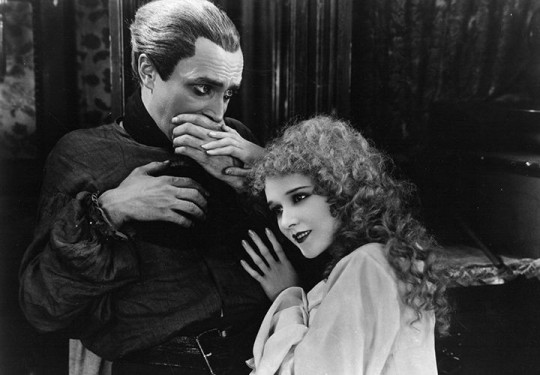
The Man Who Laughs, 1928
Dir. Paul Leni
⭐4.5/5
Watched mid-Oct, Archive.org
Nothing could have prepared me for this. Of course I was aware of TMWL, but more vaguely than I guess I realized. It's really ahead of its time. The production quality is astounding, it's an absolutely beautiful film. The whole cast is pretty great, too. The Duchess? Total smoke show. Homo the Dog? Queer icon. And Connie really swings for the fences emotionally and physically as Gwynplaine. Bear in mind, this is literally only the third Conrad Veidt movie I've ever seen (other than the basic, intro level Cabinet of Dr Caligari and Casablanca), so I was really floored by what he's able to do in this role with the use of really only half his face. There are several wonderfully haunting and heartbreaking visuals and moments throughout the nearly 2 hour runtime that will stay with me long after watching. Half a star got knocked off because the score was a little bombastic and there were one too many clowns for me personally. But those are small complaints for what may otherwise be a pretty perfect film.
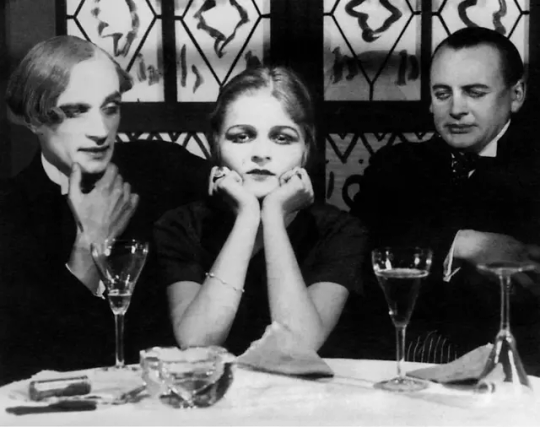
Unheimliche Geschichten (Eerie Tales), 1919
Dir. Richard Oswald
⭐3/5
Watched mid-Oct, Archive.org
A romp. The version I watched had no soundtrack at all, making for a totally silent viewing experience. The vignette structure and old school effects are fun. I enjoyed seeing Anita Berber in action although maybe I was expecting more because of all the hype surrounding her/her image. But Connie, Anita, and Reinhold Schünzel seem like they had a good time working on this project. "The Black Cat" and "The Suicide Club" were my favorite sections (and I actually watched this when I was in the middle of Netflix's The Fall of the House of Usher, so yay for extra Poe content in the spookiest month). As for Connie Content, what can I say, he's stunning.
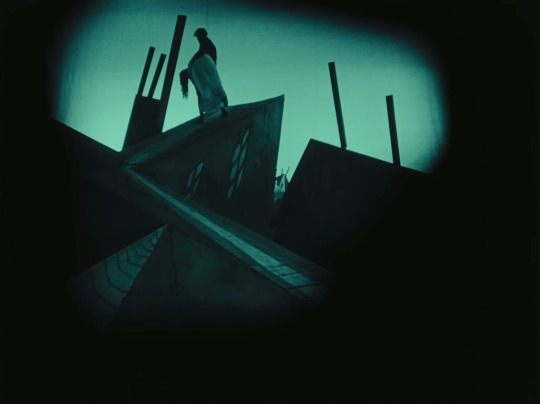
The Cabinet of Doctor Caligari, 1920
Dir. Robert Wiene
⭐3.5/5
Watched Oct 17, Archive.org
I went hard with the silent era when I started this journey. Caligari was my intro to Conrad Veidt almost 15 years ago, and as a lapsed goth art student, I remember being bewitched by his strange and off-putting presence on screen. My rating for this one is kind of low compared to how undoubtedly iconic and important of a film it is. It could have been my mood but upon rewatching, but the story fell a little flat for me. I did like the updated score in the version I watched, and I would love to see this one on the big screen maybe with a live orchestra some day.
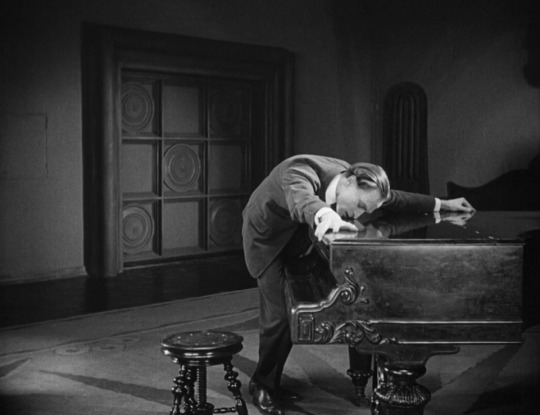
Orlacs Hände (The Hands of Orlac), 1924
Dir. Robert Wiene
⭐4/5
Watched Oct 17, Archive.org
Loved. It's so horny and bizarre (the scene with the maid crawling on the floor? same, girl, same). And visually the most pre-David Lynch Lynchian-looking movie I've ever seen. The shots that linger on highly stylized, cavernous, empty rooms before a character enters? So David Lynch. I'm also a big fan of the psychological body horror and crime thriller genre mashup. It's got twists, it's got turns. Conrad Veidt's your man if you ever needed a Hand Actor. Like the handsiest Hand Actor who ever had a pair of hands. Someone who could really work those mitts.
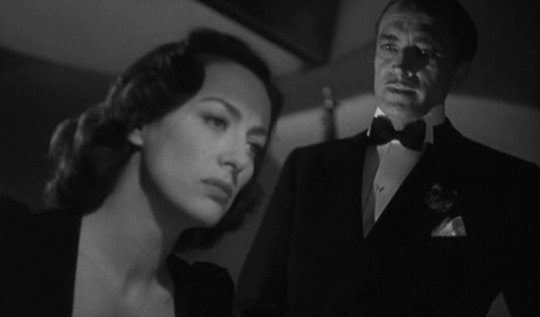
A Woman's Face, 1941
Dir. George Cukor
⭐4.5/5
Watched Oct 18, Vudu & TCM
Jumping way forward in Connie's career. This movie did things to me. This was, I think, the point of no return. It's extremely underrated, I'm legitimately surprised I'd not heard of it before diving down this rabbit hole. That said, it is strange and pretty spicy for a Hays Code era picture. It's so good, I actually watched it twice (it aired on TCM as a part of their creepy cinema series). Visually beautiful and narratively interesting, if maybe a little long despite the rushed ending. Shout out to Joan Crawford for giving what's probably the best performance of hers, at least that I've seen (Mildred Pierce who?). And then there's nasty, nasty Conrad Veidt. He very nearly steals the movie from Joan, I couldn’t take my eyes off him. He's beautiful, he's TALL, he's scary. Genuinely shocked he doesn't have second billing. But what else can I say about his Torsten Barring that hasn't already been said more eloquently by others? It's such a great character, and I believe he said it was one of his favorites during his entire 100+ film career. A Woman's Face is the only title on this list so far where immediately after watching I wanted to buy the dvd. Ugh, we deserved several more decades of Connie in roles like this.
I'll probably post the next few one day soon, where I finally get into some titles from the 1930s.
#my writing#conrad veidt#the man who laughs#eerie tales#the cabinet of doctor caligari#the hands of orlac#a woman's face
5 notes
·
View notes
Note
Apropos of nothing but I really really would love to see Pedro in the next knives out movie. I know it's probably just a dream bc what are the chances but I think it would be great. And usually I don't have specific wishes for roles, movies or TV shows bc I'm not a very creative person and just want other people to present me with a good story and good cast but that's really something I'd like to see.
Do you have any wishes like that for roles for Pedro to take?
I'm also really excited about freaky tales btw hope we get more information about that soon
I am very excited for Freaky Tales too, and also The Uninvited because of how hot he’s been looking in those bts pics. Lol Freaky Tales I am genuinely interested in the plot and want to know more.
I would LOVE to see him in an adult thriller, one of those that get you on the edge of your seat, kinda like Shutter Island. I actually do love that movie! 😅
0 notes
Text
Untitled Wednesday Library Series, Part 69
Apropos of yon manuscript, Alexis York Lumbard’s retelling of Farid ud-Din Attar’s classic, illustrated by Demi and published by Wisdom Tales in 2012. ‘Ages 6 and up’.
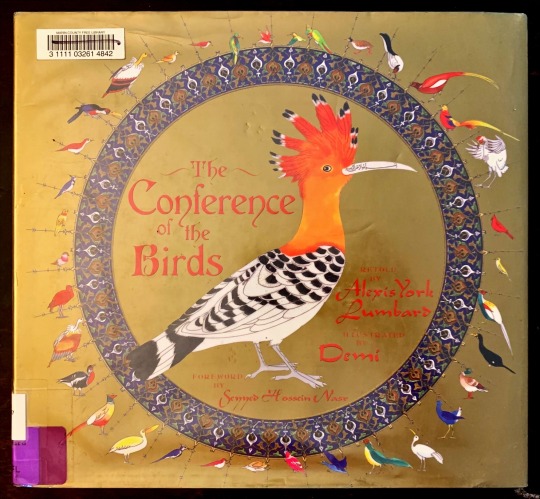
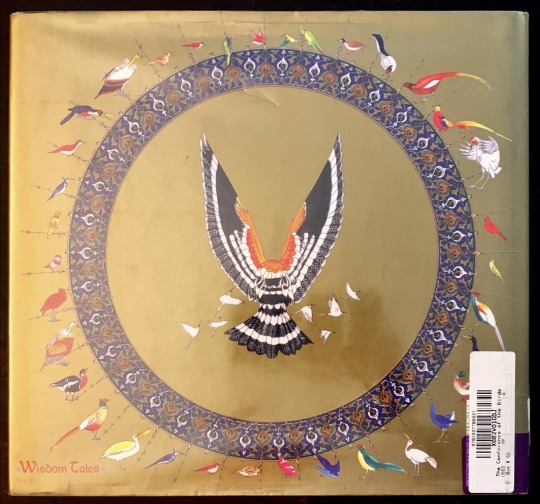
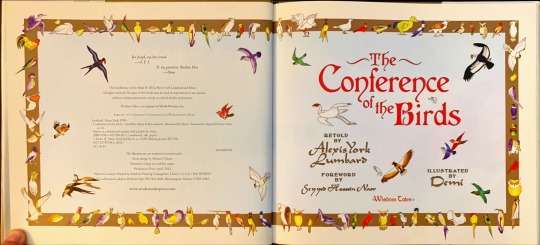
The How
A single digit number of dollars on eBay is how. Can’t resist a library discard, especially when they’ve got Demco accoutrements.
The Text
It’s been more than a long time since I so much as peeked in a translation of the original, so I really can’t say much about the details of this rendering. I don’t have any eye at all for children’s books, so I can’t say much about the broad strokes either. If nothing else the rhyming effect of the parent text sometimes shines through in a way that feels satisfying.
The Object
According to this interview with the author, it pitched to and illustrated by Demi before even being sold to a publisher, which is both very unusual and completely unsurprising as a success story. Apart from that name being a practically instant sell, the style is compelling and probably wasn’t at all hard to make as pretty as it is in the finished printing. I’d have eaten this manuscript miniature style up as a kid.
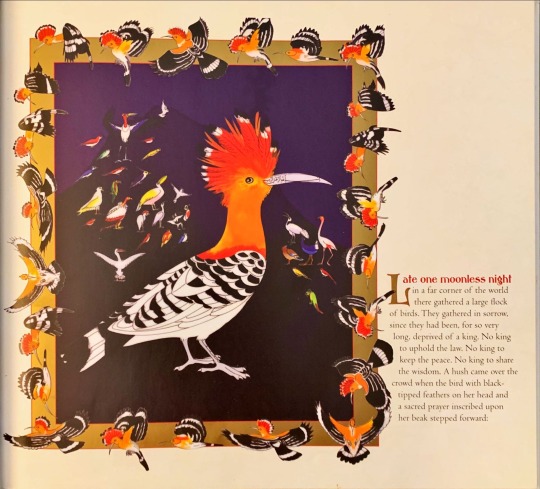
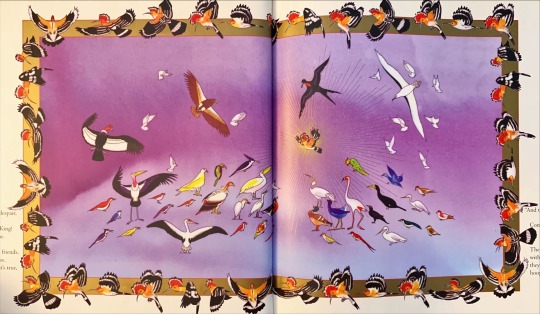
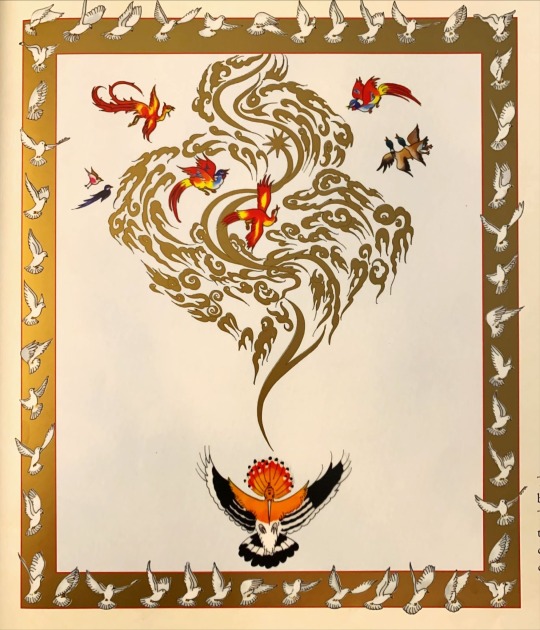
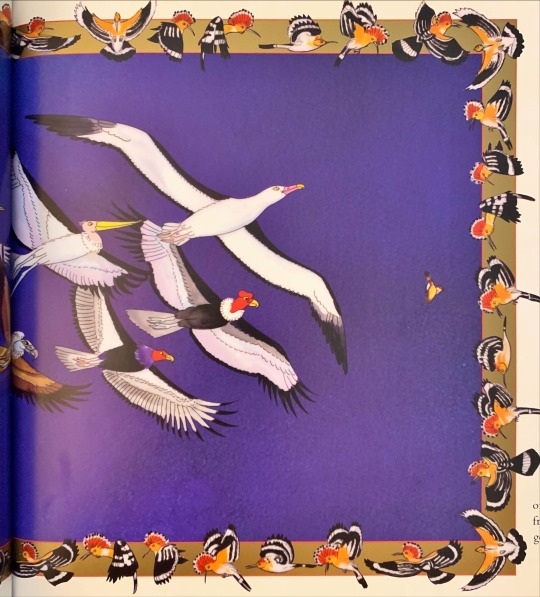
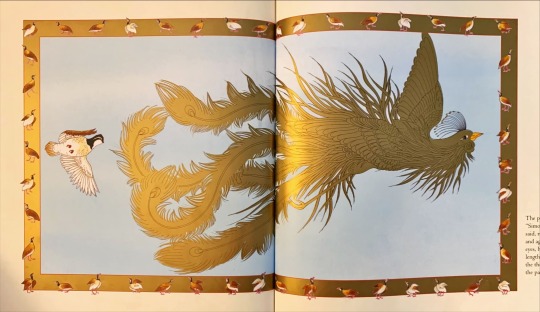
The Why, Though?
I saw some 16th(?) century pages of the story in a museum at some point ages back and I’ve been soft on it since. Not an interesting or compelling reason to buy a book, I know.
I’ll find the right person to give this to eventually, but for now I keep it partly because there’s a pointing hoopoe and I think that’s tremendously silly.
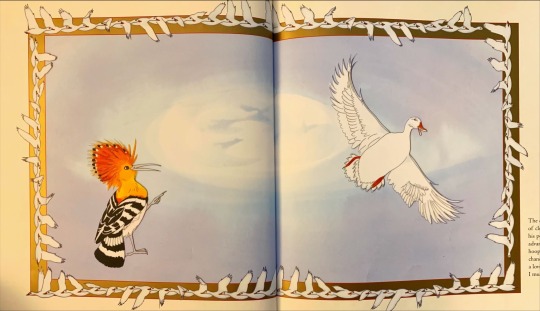
Mostly, though, I like this duck. Grumpus.
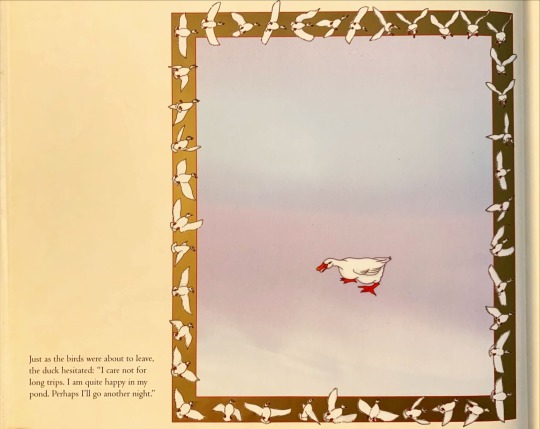
34 notes
·
View notes
Note
My theory for ice queendom is that it’s like a really elaborate Weiss dream sequence she has right before the primary personality shift in early volumes that like. Helps her chill out a bit by showing her amplified and vilified visions of her own negative tendencies as a sort of subconsciously sequenced cautionary tale. It’s canon adjacent because they can do a little “you can’t say that DIDNT happen” cause it happened offscreen but they don’t bring it up again cause having Weiss just kind of apropos of nothing be like “Dyou guys remember that dream I had where I was a dictator” would just end in “Weiss what the FUCK are you talking about bro”
it being some sort of dream sequence is really the only scenario i can see being true. weiss doesn’t have her scar anymore in the atlesian general design she has for the anime, and if it’s not some sort of alternate universe, a dream sequence is the only other thing it could be. the shot at the end of the trailer with weiss looking at herself helps elevate this theory, too.
22 notes
·
View notes
Text
we decided to watch all story cutscenes from the new resident evil village videogame on a whim, since it’s not really our cup of tea gameplay-wise but seems to be this massive zeitgeist moment that made us morbidly curious. And I know how much everyone cares about my thoughts on things I know very little about, so. let’s get into it huh gamers. and yeah spoilers?
for context, I’ve only played resident evil 4 and a small portion of 5. I also read the wikipedia entry for 7’s plot recently. all this to say I was only vaguely aware of how tonally wacky the series was going in
I also completely gave up following the plot of the mutagens’ soap opera, so that paid off in spades here as you might imagine
anyway so that baby in the intro. that baby’s head is just massive. humongous toddlerdome. when ethan finds the baby’s head in a jar later on. there is no way that head would fit into that jar. bad game design. no not even game design. basic stuff. one hundred years in prison for jar modeler
if I see a single functional hetero marriage in video games I will cry tears of joy. I understand their misery is kind of The Point irt them badly working through the hillbilly romp trauma but like. sheesh. at least set that up as an emotional story goal the plot will help resolve. but nope they start off miserable and it goes nowhere
I know I know the mia thing has a huge wrinkle in it but like. not really in terms of dramatic function?? set up a happy end to the re7 nightmare (miranda can keep up appearances for all she cares) and then take that all away from angry griffin mcelroy for manpain. it will still absolutely work to set up the dramatic forward momentum. why throw in this cliche Hollywood Tension in their marriage if you’re not going to address it oh maybe because it’s normalized as automatically interesting because nuclear families are a self-propagating pit of a very narrow chance at emotional happiness relying on social stigma to preserve their empty function oops my baggage slipped in yikes abort mission
I called him griffin mcelroy because I saw his face on twitter and. yeah. I will continue to do this occasionally. my house my rules
... fuck the reason I’m hung up on this is specifically because the rest of the game is so tonally dexterous (which is a shining point to me! more on that later!), and yet they felt weirdly compelled to create the aesthetic trapping of a family-at-odds trope without following it through too well. a sign of both the good and the bad stuff to come
but listen the real reason why I wanted to talk about any of this is to nitpick the fascinating backwards-engineered nucleus of the entire thing; in that this game essentially creates a melting pot of just SO many disparate horror tropes and then makes a no-holds-barred unhinged effort at weaving thick lore to piece them all together. it is truly a sight to behold. like straight up you got your backwoods fright night situation, your gothic castle vampires, your rural-industrial werewolves, and don’t forget your bloated swamp monsters over there, with then a hard left turn into robotic body horror, and the entire ass subgenre of Creepy Doll writ large, and the bloodborne tentacle monsters, and a hellboy angel bossfight, which rides on the coattails of a mech-on-mech pacific rim bonanza, and just jesus henry christ slow down
almost all of these are textural hijack jobs that don’t really get into the metaphor plain of any of those settings but the game sort-of makes an argument that the texture IS the point and revels in it. It is kind of admirable almost. The same reason why the intro felt boxed in and unmotivated is also why the rest of the game just blasts off of its hinges to the point of complete and self-indulgent tonal abandon. I kinda loved that about it. lady dimitrescu made sure to hold her hat down as she bent forward in mahogany doorways and then suddenly she’s a giant gore dragon and you settle in your temp role as dark souls man with Gun to take her ass down. Excellent??
this rhino rampage impulse to gobble up every horror aesthetic known to man comes to head when the game wrestles with its FPS trappings in what is the most hilarious solution in creating visceral player damage moments. Since most cinematics and the entire game is in first person, that leaves precious little real estate for the devs to work with if they really want to sell griffin’s physical crucible. To wit. This dude’s forearms. Specifically just the forearms. They are MASSACRED throughout the story. The poor man lives out the silent hill dimension of a hand model. by the end cutscene he looks like a neatly dressed desk clerk who had decided to stick both his grabbers into garbage disposal grinders just a few hours prior. like in addition to everything else it manages to rope in that tinge of slapstick violence into its general grievous genre collection except this time it IS for a lack of trying! truly incredible
but wait his miracle clawbacks from everything his poor paws go through are retroactively explained away, yes, but far too vaguely and far too late to console me as I sat and watched everyone’s favorite baby brother reattach an entirely severed hand to his wrist stump by just. placing it on there. and giving it a lil twist ‘n pop terminator-style. and then willing his fingers back into motion right in front of my bulging eyes. this game just does not care. it does not give a shit. and boy howdy will it work to make that into one of its strongest suits
cause generally speaking resident evil was THE premiere vanilla zombie content destinaysh for like a decade, right? and as the rest of the world and mainstream media started encroaching and bloodying its blue ocean it went and just exploded in every single conceivable horror trope direction like a smilodon on catnip. truly, genuinely fascinating franchise moves
yeah the big vampire milf is hot. other news; grass... green. although I do love the implication that her closet is just identical white dresses on a rack. cartoon network-level queen shit
apropos of nothing I’ve said there’s also this hobo dante-devimaycry-magneto man, and I can’t believe this sentence makes sense. anyway he made that “boulder-punching asshole” joke referring to chris redfield and it was probably the only easter egg that really landed for me and boy did it land hard. I have not seen him punch the boulder in re5, mind. I had only heard about how funny it is from friends. and here this dude was, probably in the same exact mindset as me, trying to grapple with that insane mental image. with you on that ian mckellen, loud and clear
I advocate vehemently against the shallow pursuit of hyper photorealism in art direction but I gotta admit it works really in favor of immersive horror like this. the european village shacks especially gave me super unchill flashbacks to my rural countryside retreat in western georgia. I could smell the linoleum dude. not cool
faces are weird in this game. can’t place it. nice textures, good animation, but the modeling template is... uuh strange? and the hair. it has that clustered-flat-clumpy look that harkens to something very specific and unpleasant but I just don’t know what. sue me
griffin’s mental aptitude to take all this shit in stride and end every seemingly traumatizing bossfight involving some fucking eldritch being yet unseen through mortal eyes by essentially throwing out an MCU quip is just. What the fuck dude? I mean that was funny how you casually yelled the f-word at a god damn werewolf that you considered a fairy tale an hour ago but are you like, all right?? it was swinging a sledgehammer the size of a bus at you, ethan
oh oh the vampires are afraid of cold and your last name is winters. I get it haha
Pro Gamer Nitpick: boss fights seemed a bit unnecessarily long?? idk why the youtuber we picked decided the ENTIRE propeller man fight counted towards the vital story scenes he was stitching together, but man mr big daddy lite there really had some get up and go huh??
why are they saying dimitrescu.. like that. is it really how you say that word or is the english language relapsing into its fetish for ending every single word with a consonant at all costs
I’m not saying it’s a dramatic miss of a twist in context of all that’s going on, but the “you died in the last game actually and have been DC’s clayface ever since” revelation is low-key. it’s. it’s just funny to me, I dont know what to say. century-old god-witch fails her evil plan after she mistakenly removes heart from what was definitely NOT just some white guy with eight fingers after all
chris realizing he’s about to become the player character and immediately swapping out his tsundere trenchcoat for the muscletight sex haver sweater
the little bluetooth speaker-sized pipe bomb he taped to his knife was nuclear?? really??? I must have missed something because that is just too good. I buy it though I totally buy it. chris just got them fun-sized nukes in his car trunk for, you guessed it, Situations
anyway this is all for now just wanted to briefly touch on how unexpectedly funny and tonally irreverent this seemingly serious game turned out to be. did not articulate any cathartic story beats whatsoever but my god it had fun connecting those plot points. he just fucking put his severed hand back on his stump and it Just Worked todd howard get in here
#text#another one in my bulleted review series with no rhyme or reason#sorry resident evil fans this could be a painful read pls turn away#i know almost nothing about it but i am gonna be super fake familiar and critical of this one hey ho
23 notes
·
View notes
Text
Out of nowhere and apropos of nothing, a rambling incoherent list of things about Nott and Nott-and-Caleb that give me Feelings.
On Veth Brenatto/Nott the Brave:
Nott’s entire life is all about seeing/presenting herself as less than she is.
She was bullied as a child, by her brothers and the neighborhood boys.
Then she was a contented housewife and mother, but always saw herself as second to Yeza--a support figure, depending on him, learning from him, not even necessarily deserving of his love.
“Not pretty and not brave and not coordinated and not smart and just...not.”
“He didn’t mind my strangeness...He was a brilliant chemist. I helped him and he took care of me.”
(When she reunites with Yeza, she undermines her ‘dabblings’ in alchemy in comparison to his apparent brilliance.) (Yeza himself disagrees.)
When she does acknowledge her strengths, she also acknowledges their origins, and they are either very sad (“I’ve been chased a lot in my life by boys making fun of me. I’m pretty fast.”) or serve to highlight someone else’s assistance and forethought (“a vial of acid that Yeza handed me”).
The transformation she was forced to undergo was a curse straight out of a fairy tale. It made her what she thought she was, and forced her to appreciate what she had been, but it was too late. (“But you’re so pretty!” / “I was.”)
But her whole life is about other people turning her into things, isn’t it? The bullies made her a victim, Yeza made her a wife/mother/alchemist’s assistant, and the goblins and their mystery woman made her a monster.
She was someone beautiful who could not see her beauty, someone wildly unique and “strange” who could not embrace her strangeness and flaunt it without apology...
...Until she was turned into a goblin.
Being a goblin has been so weirdly freeing for Nott. She felt that she had hit rock bottom, and in many ways, she just...let go. No more struggling to fit into social norms. No more squeezing into boxes of other people’s making. The Nott we know has always fought and shrieked, drunk to excess, stolen anything she admired, openly shared all her most outrageous suggestions, shown off her weird collections without shame.
I’m not saying all of this is healthy! Some of it is clearly coping mechanisms, and dangerous ones at that. And Sam has stated that he sees some of her excesses as being related to her goblin physiology, which emphasizes once again that this role, like all of Nott/Veth’s previous roles, is one that was forced on her. But. But.
So much of it (I would even say that “all of it” is a valid interpretation) is really just...Veth. Just Veth dialed up to eleven, without the constraints. Is she embodying a stereotypical view of goblins, or is she just letting herself be angry, messy, hedonistic, and weird for the first time in a short, sad life in which other people made her smaller than she was until she learned to do the same thing to herself?
Nott wants her true body back. She wants to be a halfling again. But she is not at all sure she wants to “go back.” To Felderwin. To her old life with the husband and son she loves. Of course she isn’t sure.
Because she’s grown so much bigger than that. Bigger and stronger and louder and messier than anything she used to be. Bigger than all the boxes she used to occupy. Bigger than anything Yeza or Luc can quite understand, because they weren’t there by her side, watching it happen.
On Nott and Caleb:
Nott defines herself by the people around her. She always has.
She met Caleb in that jail cell, saw him as small and weak and needy, and jumped at the chance to occupy a familiar role again: mother.
...Except that it was never that simple. That’s the piece that, for me, was missing from their relationship for so long. The piece that fell into place when Nott’s (former?) crush on Caleb was revealed, and made it all fit together. It was never that simple.
She wanted something from him. Veth never seems to have dared to want things from the people around her--she lived to serve her loved ones, to help and protect them. But Caleb? She wanted his magic. She wanted him to help her. And she didn’t tell him, not for the longest time. Call it ruthless, call it manipulative, or just call it a very understandable cocktail of hope and panic and shame--but it was her goal, her desire, and it meant that no matter how much she cared for Caleb and protected him, their relationship was never All About Him. She was playing her own angle the whole time. And also...
She was attracted to him. This was a fact that she absolutely could not acknowledge, because it was transgressive in so many ways. Extramarital attraction. A hideous, monstrous goblin attracted to a “handsome” human. A lifelong sidekick/helpmate/bit player in her own life daring to want a “great wizard” not only for his magic (that, at least, was permissible, because it could return her to her proper place, to her home and family; it could restore the status quo), but for his body, mind, and soul. She looked at him in that cell, in the moonlight streaming through the bars, and she wanted. And gods know it wasn’t because he ever invited her to.
(Though he didn’t scorn the idea either. I keep thinking about the scene with Keg in Shadycreek Run where she mistook them for a romantic couple and Caleb defiantly rolled with it. I even think about that early episode where Liam inadvertently used a German term of endearment for her that had romantic connotations. And the way they always slept cuddled together, and she rode on his shoulders, and they have always, always celebrated every aspect of each other--body, mind, and soul.)
But the point is that Nott’s relationship with Caleb is not one that he defined. She was always the stronger of the two; she called the shots. It was she who chose to be his “mother,” and the twin secret desires that burned deep down in her heart were entirely her own.)
On Nott and character development (ok, I just wanted to break up the bullet points a little, because goodness, this has gotten long):
...And she fundamentally did not know how to handle that. So she kept those desires buried, kept them secret. She tried to move back into her comfort zone, letting others define her and her relationships, going along with their assumptions without protest.
It is fascinating to me that the other players and characters and the viewers spent much of the campaign assuming Nott was a child. And she just...let it happen.
“I’m of child-bearing age,” she said when Jester asked, but even then, some of us (myself included, I confess!) just mentally aged her up to a rebellious teen.
To a man who she regarded simultaneously as a son, a love interest, and a tool for her own redemption, she was seen as a daughter or a little sister...and she went along with it in so many ways. It’s the lie she embodied from the first moment Sam introduced her, and referred to her as “a little goblin girl.”
Nott has always made herself lesser than she is...or let other people do so. She is so used to being diminished and self-diminishing, so leery of her own messy desires, that she would not even insist on her own adulthood until...until.
Nott’s heroic moments--the moments when she fully unleashes her own courage and strength and anger--are always the moments when her loved ones are in danger. She is the classic self-sacrificing wife/mother figure, whose self-dimmed light only shines out when others need it to.
Like when she fought the goblins and helped Yeza and Luc escape.
Like when Fjord threatened Caleb, and the others were all turning on him, and she needed to assert her own right and ability to protect him. (“But I am the parent, you do realize that, don’t you?”)
Like when she led the lizardfolk away from the others on Urukaxl. Like all the times she dove into the water for Fjord. Like when she didn’t disengage from the dragon.
“Nott the Brave” has so many layers--an ironic, self-mocking epithet, a badge of honor, and a promise to be brave for others. Only for others.
Because then it’s not really her bravery, is it? It’s borrowed from her loved ones. She is a coward who is occasionally made into something else by the brighter, stronger, worthier people she surrounds herself with.
“Self-diminishing” and “being defined by others” are the absolute fundamental cornerstones of Nott’s character. And this is both reinforced and very much complicated by her recent status as a goblin and her relationship with Caleb. (...You know how sometimes you don’t figure out your thesis statement until halfway through the essay?)
On Nott and Caleb, part 2:
The M9′s trip to Felderwin changed everything--everything--for her and for him and for the two of them. It was one of the most staggering turning points of the entire campaign.
I’ve written about this before. How one of the central “Will they or won’t they?”s of the campaign was about Caleb and Nott deciding to trust the group, and that was the point where it was resolved...
...and how, in trusting the group, they sacrificed their codependence to a large degree. How Nott’s infamous “Fuck him!” was less about anger, in the long run, than about taking her best friend off the pedestal she’d put him on, about acknowledging his fallibility, and being comfortable openly disagreeing with him.
It was about Nott becoming her own person, and Caleb learning to see her as her own person, and not just his “little friend” or protector.
But. But. It still followed the pattern.
It was about Yeza and Luc. It was about her family. It was the greatest disaster that had befallen her loved ones since the goblin abduction, and her reaction was correspondingly big.
Of course she could be brave. Of course she could be angry and assertive. Of course she could, for once, discount the feelings of her beloved wizard. Because her husband and son were in danger.
When will Nott get to be brave on her own behalf? To be angry on her own behalf? To want, want, want something, something ever so much bigger than a button, openly, unashamedly, on her own behalf?
And I think I might know the answer to that question: When she openly acknowledges something that she has already hinted at, danced around, in conversations with Caleb here and there.
“I ditched my husband in a den of monsters to go adventuring with you.”
She said this to Caleb while they were riding a moorbounder together in Xhorhas, and something about it has resonated hard with me ever since.
That conversation--and the other couple of conversations Nott has had with Caleb that deal with her own conflicting desires--felt strangely like a failure. Like Caleb was sincerely doing his best to help her, but wasn’t quite getting what she was putting down.
He doesn’t know how to stop her drinking, her constant anxiety. How to soothe her fears about the future. He doesn’t know what she needs.
Is it reassurance of her family’s love? That’s been offered to her repeatedly, by Yeza, by Luc, by Caleb himself, but it’s never had much of an effect on her darker moods.
Is it her own body back? That would help a lot, for sure. Like every other member of the Mighty Nein, she’s on a journey to find herself. She thought, initially, that it was purely a journey to find something she’d lost. Caleb and the rest of the M9 think so too, I think. But there’s more to it than that.
What Nott Really Needs:
“I think you have to find those answers,” Caleb said to Nott as she expressed her ambivalence about returning home and resuming her housewife role. “Can’t you just tell me?” she pleaded.
That’s it right there, that’s the crux of her journey. And it isn’t just a journey back to a body or a family or a life she lost--it’s a journey to something entirely new. Nott craves the familiar, the safe, the known; she keeps trying to make herself small and unimportant again, to convince others to define her. But they can’t. She is too much, too big, too weird and messy and wonderful, for anyone else to squeeze her into a box anymore (she always was; she just didn’t realize it). And Caleb is the one to tell her that.
“I ditched my husband in a den of monsters to go adventuring with you.”
“I love you,” she told him on the beach of Nicodranas, and sure, she meant it platonically (probably) (mostly), but it was more than friendship, more even than romance. She loves what he represents. And--the one thing she can never, ever, ever acknowledge, because it is completely antithetical to her journey as she currently sees it--a part of her loves who she has become while traveling and fighting by his side.
“These days I’ve spent with you are the most exciting of my entire life.” That’s something Fjord said to Caleb once. And I’ve posted before about how eerily similar Fjord and Nott’s journeys are.
They both had rocky childhoods marred by bullying and badly bruised self-confidence, then embarked on simple, well-defined lives/careers in which they felt utterly content...and then they both literally drowned, both lost their friends/family/life roles in the process, and both got transformed into something “dark” and “ugly” that they couldn’t come back from.
And the clincher? The thing Fjord was able to admit to himself and others, but that Nott carried around like a deep, dark secret and is still struggling hard with to this day?
They both fell in love with their new lives and roles in spite of themselves.
Yes, Fjord renounced Uk’otoa in favor of the Wildmother...but he still retains his warlock powers. Yes, Nott wants to, can, and probably will be turned back into a halfling--but she will never again be a person who was not a goblin.
She does not want to be a person who was not a goblin.
She wants Caleb, and all he represents. She wants adventure and excitement. She wants to be strong and brave and important, not only to protect her loved ones, but because those things bring her fulfillment. Because they have shaped her self-image in new ways that she cannot discard.
The duality of her names reflects this perfectly. She always uses “Veth” around Yeza and Luc, and wants them to use it for her, but with the M9, she’s still “Nott the Brave”-- or is it “Nott, the Brave”?
Caleb uses both names for her.
Caleb. Uses. Both. Names. For her.
Nott needs to be herself. It’s what all the members of the Mighty Nein need, really--this is a campaign about identity, as Matt has said--but I think it’s coming harder to Nott than any of the others, and that’s why I’ve had such a hell of a time pinning her down as a character...because she has had a hell of a time doing that, too!
Because she can’t acknowledge what may be the greatest possible shame for a stereotypical girl, wife, mother, or monster...
Wanting to be herself. Wanting things simply because she wants them. Wanting to be someone you can’t pin down, either literally (in a cozy little cottage in Felderwin) or figuratively (in any of the aforementioned roles).
Nott wants to define herself. But she doesn’t quite know she wants it. And she doesn’t know how to do it. But part of her definitely sees that getting her body back, while essential, is not enough.
And so she panics and drinks and goes into existential tailspins because no one else will give her the answers. Caleb has come closest, in telling her to seek them for herself...but Caleb has his own baggage, and can’t quite let go of his great ideal of Family, of Going Home Again. Of turning back the clock and erasing the dark corners of one’s past.
So he sees Nott’s happy ending as husband and son, hearth and home. And it isn’t enough. It’s as tidy and false and messy and comfortless as his time-travel fantasies. And that’s where their stories ultimately intertwine...their desires at cross-purposes, their solutions at odds. Nott longing for something that Caleb is giving her (adventure, excitement, a purpose, the privilege to bear both her names and faces and diminish neither, to be fully herself for the first time in her life). Caleb wants something that was taken from both of them. Neither of them yet fully understands that you can’t go back, that the only direction is forward. Into greater messiness, greater complexity, greater understanding of themselves and the things they can accomplish, alone and together.
But they’re getting there. They’re both getting there. And I absolutely cannot wait to see where their stories lead.
#critical role#nott the brave#veth brenatto#caleb widogast#fjord#widobrave#in another world maybe#nott#veth#caleb#long post#incredibly unbelievably long post#what have i done
1K notes
·
View notes
Text
"Everyone only writes about Peter ..."
[Carl Interview from september 2004, translated from german]
Carl Barât is beautiful. And so self-confident that he deliberately intensifies his mumbling for an interview ... and at the end asks charmingly, if it was bad. This is what the libertines are like: the outside world belongs to them. Inwardly, they are sensitive and vulnerable; just stumble over the simplest questions.
Carl Barât stands in front of me relaxed and damn good looking. Is that supposed to be the same one, who stared at you so pale with his distraught look from the album cover? The one who looked clearly youthful on the last tour? Now it is hard to believe that this man who comes up the stairs to the interview room with his shoes clattering loudly is only 26 years old.
He sits in front of me completely relaxed and mumbles "It's really hot here". And that where the libertines have just come from a festival in sunny Italy. Without Peter Doherty. Last year it still seemed inconceivable that the Libertines would finally break up their front man duo and go on a full tour without the problem child. In the meantime you look at their second album in disbelief and wonder, why the band even managed to record a second album.
This may be mainly due to their new manager Alan McGee: The man, who tamed the Oasis brothers, "chose us. He saw our problem and wanted to change something. He saw that we needed help ... and he could help us a lot." But how do you help a band like the Libertines, which Carl himself calls "difficult to manage"? Certainly not by slipping into the role of a contract dealer as a manager.
Much more important was McGee's human instinct: "He persuaded Peter to go to rehab. As a manager, he protected him from certain things." It was McGee who kept this complicated band structure together even in difficult times. "He's great", Carl summarizes his assessment of Alan McGee. And while he is saying that, he stops mumbling so outrageously for a brief moment. It seems important to him that he is understood here.
The effects of McGee's involvement may be good for Peter. But Carl obviously takes this topic with him. What he misses most about Peter while touring Europe without him, he has to think about for a while. Hasn't he been asked this question a thousand times? Is it so important to him that he has to look for the right words first? "A sense of unity ... our success ... when we work together you can feel that we are achieving, what we want to achieve"
But the songwriting is not always so cozy: I would like to know whether there is cooperation or rivalry between the two when writing. Again Carl has to think twice to come up with a monosyllabic answer: "Both a little."
The friction between Doherty and Barât is constant. While the songs of the Libertines on "Up The Bracket" still had a clear framework that held them together, this now seems to be falling apart like the bond between the two front men. The dispute between Carl and Peter is reflected on every corner. But was this step towards being less catchy really a conscious one? "No, you don't do that on purpose. It's just different. It was a bit more sincere than the first time. Because we knew that we had people's attention", explains Barât the self-image when working on the second album.
But could the irritable, violent mood that prevailed between the heads of the Libertines during the recordings for the second work have released positive energies? "Violence?" Asks Carl in disbelief. I try again, if the trouble in the band also unleashes positive energy. "Having troubles? I don't think so! But, well ... I don't know if I really understand the question." I'll make it clearer: if you argue in the studio, for example, doesn't that help you? "But I wouldn't say that that's positive. Maybe it has something to do with passion. I don't know."
Often in the last few weeks it has been written that the album should tell the libertines' view of their own story of friendship, setbacks, and forgiveness. It is intended as a reply to the countless articles in the tabloid press. But Carl Barât doesn't want to know anything about that this afternoon in Berlin: "No, I don't want to oppose anything to the boulevard. I don't want to have anything to do with this world." These are just stories about life and music. "We just want people to listen to us." Which is difficult, because "everyone only writes about Peter. Unfortunately, that also overshadows the album." Carl finds it "hard to do interviews. You reveal so much personal information. And when you are unlucky people write really terrible things about you, especially the tabloids."
Contrary to Carl's attitude, Peter literally runs to the gossip papers and tells them his hot stories of addiction, disappointment and hope. You'd think Carl would be incredibly pissed off at this behavior: "No, not really ... as long as he's telling the truth! Which is not always the case ... And then I get very angry."
Nor is he really surprised by rumors that Peter is posting libertines demos on his Babyshambles site. When asked about this project by Peter Dohertys, he first sighs for a long time. "I don't really want to talk about that." No problem. This often seems to be the keyword for Carl. As soon as you tell him: It's OK, you don't have to talk about it, then he decides to do it: "Oh, I don't know," he says, and sounds like a worried mother, "I'm never really surprised about something like that. Just disappointed. "
Carl has no contact with Peter at the moment anyway. He must first "stop using crack and heroin" before he can return to the band. Is it likely that it will stop? "At the moment I don't believe in it," Carl mumbled quickly and incomprehensibly. Despite all this, he continues to think that the Libertines are a very romantic band, dreams of his fairy tales of Albion and Arcadia. And about the fact that everything will be fine again: "The band will definitely go on". The question is not whether, but how things will go on with the libertines.
Even the hype surrounding the band didn't leave any significant marks on Carl: He only noticed something in interviews anyway. "But no, that has nothing to do with my world." Much more important than the gossip magazines are the fans, with whom the Libertines have developed a very special relationship, especially in England. In their homeland they often play "intimate gigs" that are announced on their homepage shortly beforehand. With his "Babyshambles", Peter Doherty has already gone so far as to organize concerts with fans or even at home.
But what is the intention behind these concerts? They have enough fans anyway: After all, their second album in England hit number one in the charts from scratch. "I like to play the guitar, make music and be in bands. And I like those big buses, stopping somewhere, driving off again, and all the other stuff, I don't like. But that's probably how it is when you play, on the road. If you want to make music, you need an audience that wants to hear you. "
Manager McGee not only attested that the Libertines had an intimate relationship with their fans, he even called them the "most culturally significant band, perhaps since punk emerged". "He's our manager, he says a lot of things like that." You don't want to believe it, can't the convinced Carl understand such a statement? "But I think so. It's about passion. You have to show people that they should go their own way. You have to show them a way."
To encourage young bands to go their own way, Carl also has his own club project in London. "I do this to have a nice evening. And there are people who want to go on stage. There are some brilliant bands that I want to give an audience to."
The moment I signal to Carl that I don't really have any more questions, he suddenly comes to life. His mumbling settles on a bearable level, he offers me a butt and starts chatting away. That he is looking forward to the concert tonight because he remembers the German audience as so "passionate".
And that the Coke Light Lemon he is drinking is really disgusting: "it has never seen a lemon in it‘s life." Suddenly he's relaxed, joking about how gross Coke Vanilla is, too. Then he would like to know something about monuments near the Berlin Victory Column. Whether it had something to do with the Second World War. Apropos: is the libertines song "Arbeit Macht Frei" a provocation? "It has nothing to do with Germany or the Germans. The song is about something that has historically been synonymous with hypocrisy and hypocrisy." All right.
Carl explains to me, that the builder of the Oberbaum Bridge killed himself because the bridge was not high enough ... and finds this an understandable reason for suicide. But even now he remains a little skeptical. What remains is the fear of the lurid tabloids that want to squeeze out the history of the band even further.
"Oh what became of the Likely Lads? What became of the dreams we had? Oh what became of forever?" Can something like this band, shaped by a back and forth between friendship and rifts, really last forever? "I don't know, I've never tried!"
source: https://www.laut.de/The-Libertines/Interviews/Jeder-schreibt-nur-ueber-Peter-...-13-09-2004-240
30 notes
·
View notes
Text
Alright I’m back and I’m starting fresh. I miss this. I miss writing and all of you.
I’ve moved to another state and I’m settling in. Hope y’all are doing well and if not, may you find some happiness soon.
If you don’t already have me on Discord, DM me for my username.
EDIT: If you’re new here, check my sticky post nav for rules, about the writer, AUs, and muses. I welcome new faces and questions for clarification, but regarding the rules: Please don’t make me repeat myself.
EDITx2: If you DO have me on Disc, hit me up for chatting! I’m sorry I haven’t been around. Life has been a repeating kick to the trousers for months and things are finally looking up. Always happy to hear from people.
9 notes
·
View notes
Text
Splash Mountain, Br’er Rabbit, and the Tragedy of Being Represented By Other People.
So, this is probably going to be the realest post I’ll make for a while - or at least until The Boondocks arrives, but it seemed apropos. Immediately after this I’ve got rants about sci fi and Star Wars and other unrelated things coming up, but for now we have my earnest opinions on a decision I feel should have been better thought out than it was. This is going to read more like an article or an essay than a review, but I think it needs to be said.
It hasn’t come up too often on this blog, but I am African American. It’s my life and my perspective. And as an African American, a lover of animation and - though this definitely doesn’t come up on the blog - a passionate folklorist in what you could call an academic sense (in that I’m a writer and a student, and folklore is the subject of most of my research), people I know in real life have asked me more than once what my opinion on the removal of Splash Mountain in favor of Princess and the Frog, how I must be glad it’s finally being removed, what my take on the history there was, and…
Well…
To really give that opinion, I’ve got to start at the beginning. Not Song of the South - that, if anything, is the very middle. We have to start with Br’er Rabbit and who that character was. Sit back students, info dump incoming.
Br’er Rabbit is an folklore character of African American origin with - like many folkloric figures - a difficult to place date of origin, but he was known to have existed at least since the early 19th Century, He has obvious similarities to the far older figure of Anansi - with several Br’er Rabbit tales even taking elements of Anansi stories verbatim - though with a the notable difference that unlike Anansi, Br’er Rabbit was more often a heroic figure: an underdog and seemingly downtrodden figure who used his wits and his enemies’ hubris rather than physical force to win the day. The meaning of that kind of figure to an enslaved people is obvious, especially when you compare Br’er Rabbit to another, contemporary trickster figure in African American history by the name of John. Br’er Rabbit’s stories could even arguably be seen as a more child-friendly version of the John tales, in which a human trickster pulls the same kind of momentum turning ploys on villains - but those villains tended to be explicitly slave masters or overseers, and John’s payback often came with explicitly deadly results. The existence of John as escapism for the enslaved or just-post-enslaved (IE Reconstruction) populations is clear: a person who with no power who could fight back with nothing but their mind, preying on the fact that their enemies see them as incapable and helpless, and the connection of Br’er Rabbit to that message is difficult to deny. If anything, Br’er Rabbit comes off as a somewhat more child-friendly version of the concept.
But the most important thing to glean from this is who and what Br’er Rabbit is: a product of the African American community and its history, as a means of those people to express themselves and their values in the face of oppression.
Now we fast forward to 1881, and along comes Joel Chandler Harris: a white Georgian. Harris was a folklorist himself, and travelled the country collecting stories - most famously Br’er Rabbit stories. His stated reason was to bridge African American and white communities by sharing stories, but he was tainted by the perspectives of his world and his place in it, infamously creating a framing narrative for those stories in which the character telling them exuded the imagery of subservience and simplicity that was typical of perceptions of African Americans from the post-Civil War Southern environment in which he collected them: Uncle Remus, in other words. Harris is hardly the only white curator who adapted stories of black or brown peoples in a way that played up the people the stories came from as something of a theme park piece, as if noble in unintelligence and simplicity, but he’s one of the most famous ones to do so - and that’s because of the adaptation.
To note, when people criticize cultural appropriation, this is the kind of thing that really triggers the outrage. Not any situation in which a white person is inspired by someone who isn’t white and creates something accordingly, but situations where someone else’s creation is taken and used for the fame and profit of others, to the detriment of the people who made it. It’s these situations like the one Joel Chandler Harris created centuries ago, specifically, that people are trying to draw attention to - even if sometimes social media gets a bit trigger happy sometimes, that’s the real, underlying problem. With that in mind, let’s put that aside and move forward.
Fast forward again to 1946. Walt Disney Productions, then less the company of grander, wider scale stories of epic quests and emotional upheaval that make us all cry and more a company more known for folktale adaptations in general, were looking for a but of American folklore to headline a live action, animation mix - a medium that allowed a bit more financial benefit, as straightforward animation was not always particularly profitable those dates. This wouldn’t be the last time they produced an adaptation of an American folktale or short story - their version of The Legend of Sleepy Hollow a few years later being actually one of the more faithful adaptations of that short story put to film. Disney, who evidently read Chandler Harris’ stories, put together a project to see if they could adapted. Which they did. Pretty much verbatim. This is actually worth pointing out: the actual Br’er Rabbit stories in the films are very accurately adapted, and the actors involved in the story (including James Baskett, how also played Uncle Remus) did a fine job characterizing them. The issue is that Disney also adapted Chandler Harris’ stereotypical and offensive framing device pretty much verbatim, bringing Uncle Remus. And therein lies the problem.
To put the issue with Song of the South in perspective, the movie - with the framing device - can be categorized as something called Reconstruction Revisionism - which is basically a genre of post-Civil War media meant to present the pre-war South was perfect and idyllic, and that people are racially more natural in that environment’s dynamic and never should have left. One of the most infamous movies in history, Birth of a Nation, is the crowning example of this genre. Obviously, Song of the South is nowhere near as awful and inflammatory a movie as that, but there’s a degree to which it was seen as the straw the broke the camel’s back for black depictions in media, only a couple of years after Disney’s Dumbo also did the same. The end result, an African American creation was used in a film that ultimately demeaned the African American community, a decision that Disney has been ashamed of ever since.
Fast forward to now. Disney is removing Splash Mountain, the sole remnant of Song of the South that focuses exclusively on Br’er Rabbit - a choice we’ve had reason to suspect was coming for about a year now, but which was unveiled conspicuously in the middle of protests and campaigning for better treatment of people of African descent worldwide. The reveal was a rousing success, with people applauding the decision to finally wipe away the rest of that movie - though remember that for later, that the response relies on the perception of Br’er Rabbit as something that starts with Song of the South - and replace it with something else. Surely, as a black person I should be happy that they’re finally getting rid of that racist character for good and replacing him with something more positive? And again, well…
To put short, Br’er Rabbit has finished his journey from African cultural symbol to discarded pariah, all because others used the character in racist ways that they themselves now regret. And for that… let’s be clear, I’m not angry so much as saddened. I’m not railing against the company for making the choice, since I can see how from their point of view it was the wisest and most progressive thing to do. Song of the South is a badly old fashioned movie that they’re right to want to move on from, and it’s their right to downplay characters within their purview if those characters reflect badly on the company. I’m just outlining the tragic waste of it all.
For now, compare Princess and the Frog - the thing they’re replacing it with. I do love the movie, or at least any problems I have with it have little to do with representation, and I definitely don’t have anything against Musker and Clements and their beautiful visions and creations, but it’s difficult to deny that its an adaptation of a European story, adapted by a collection of mostly white creators (with Rob Edwards comprising but one third of the screenwriting team, but not of story conception), that’s ultimately just dolled up with African Americans characters and a very Hollywood-esque depiction of a African diaspora religion (Voodoo, which unfortunately has a long history of such portrayals). If we’re talking about representation specifically - which this move had definitely been presented as a champion for - it’s not the perfect example, more of a story with a surface covering of the black experience than one with an especially strong connection. That wouldn’t necessarily be a problem (Tiana and her story do well depict strong black characterizations, and approach an interesting (if light_ implication about racism and hardship during the 1920s) if Disney had yet created any other franchise that was another actual adaptation of an African or African American tale or story (with involvement from such actual people), but Song of the South is actually it. They legitimately have nothing else to call on.
This is something I feel we should do more to remedy. I am a writer/prospective screenwriter myself, and trying to put more stories out there is one of my primary focuses and goals should I ever truly enter the industry, but at the moment we just don’t have very many options.
This is hardly the only time that people of color have had little control over depictions of their own culture - literary and film history is full of such situations in both minor and terribly major ways - but it’s something that stings especially hard due to being such a current example, and because of sheer irony of the end result. Now we have a situation where African Americans are being told that something their people created to represent themselves is negative and wrong, because years ago other people appropriated that creation and used it to paint a negative picture of the people who actually held claim over it, and now the enterprise that those people created wants to save face: another example of culture being treated like a possession of the ones who are poised to make money of off it. And what’s worse, while the culture is used and abused like trash, the people are now presented with this removal like it was a prize - like they’re finally being given something - when little has really changed.
Ultimately, the Splash Mountain news - though it had been coming for a while - made me rather upset for that reason. As a studier of folklore, I suppose I knew better than most where these things came from, and so the buzz around the move being a belief that Br’er Rabbit was an intrinsically racist character just highlighted the tragedy of how African Americans and their culture tended to be tossed about by American media. So no matter what, I can’t feel particularly happy about it.
Let me iterate, in the film industry, being represented by people who aren’t of your culture group is basically inevitable. That’s essentially how the industry works. I’m not saying we should rail against anyone who would try to represent cultures that aren’t their own. The people who produce and create are few, and eventually the truth is that you have to be represented by other people - at least for the moment. We shouldn’t be railing against representation by others in general, as that wouldn’t be cognizant of the situation and thus self destructive. What I’m saying is that we - both we trying to be represented, and those doing the representing - should be aware of the problem there: that when others choose to represent you in media, you essentially have to trust them to have a real interest in you and your best interests when doing so, and when they don’t that depiction is there forever. So it behooves us to try to be the ones who are representing ourselves as much as possible, and in situations where we can’t, to remind those who want to represent us that they have a responsibility to do so effectively.
This is Animated Minds for Animated Times, and really this blog is ultimately about emphasizing what makes animated media work, what makes it fun, and what makes it worthwhile no matter how old you are. And so in several years of sporadic and infrequent reviews, reactions and fandom posts it’s been rare for me to get this real about a topic, but this is something that is a serious issue feel was overlooked. Representation is complicated. And more often than not solutions that are handed to us are more band-aids that look like cures than necessarily being actually helpful, and that’s what happens when ultimately the decisions about how you’re represented lie in the hands of other people. Representation is one of the biggest things we need to work on in coming years, especially with stories and adaptations - which refer to history and culture that are often not widely known or accepted. Ask someone if they think there should be an African princess, and they’ll tell you they didn’t even have kings and queens in Africa - something that’s bluntly wrong, but is widely believed simply because those elements of culture are never represented.
And that’s the sum of my thoughts on the subject. I hadn’t updated the blog in months because this whole thing was stewing in me, and I couldn’t really go back to cheerful posts about new things until I got it out. I’ve got great thoughts about the Owl House, Amphibia, the new seasons of BH6 and Ducktales that are totally coming up soon. But for now, just a few sobering thoughts from someone who grew up loving cartoons, and desperately wishes people like me had more to look at in that field beyond apologies and promises.
#splash mountain#disney#song of the south#the princess and the frog#brer rabbit#social commentary#black lives matter#representation#walt disney world#joel chandler harris#uncle remus#cultural appropriation#real talk
82 notes
·
View notes
Text
It's my birthday...!!!
...And to celebrate, I thought - apropos of nothing, really - that it'd be fun to go through the first seven series of Thomas, and pick out my favourite episode from each one.
Series 1 - Down The Mine
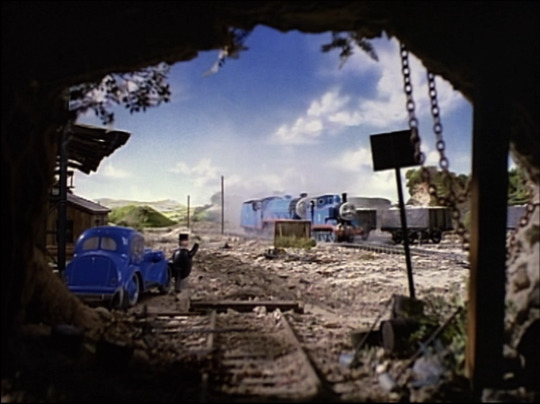
I don't really know why I enjoy this one so much. I suppose it's mainly nostalgic attachment, considering I had this episode on VHS. Other than that, it's a nice simple story, making the best of a limited number of sets and characters, and supported by some really good directing in places. Bonus points for this ending shot, which is one of my personal favourites...
Series 2 - Thomas & Trevor
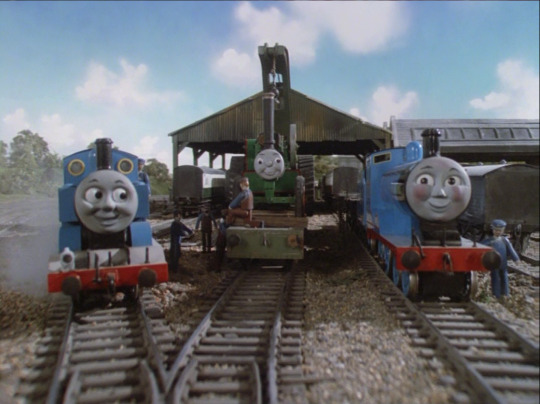
Series 2 marked a step-up in both scope and scale, with a mix of simple tales and deeper morals. This episode is a good example of the former, and while not a lot seems to happen in it, I like it because it's very low-key, low-stakes, and it acts as a nice little follow-up to Trevor's introductory episode.
Series 3 - Trust Thomas
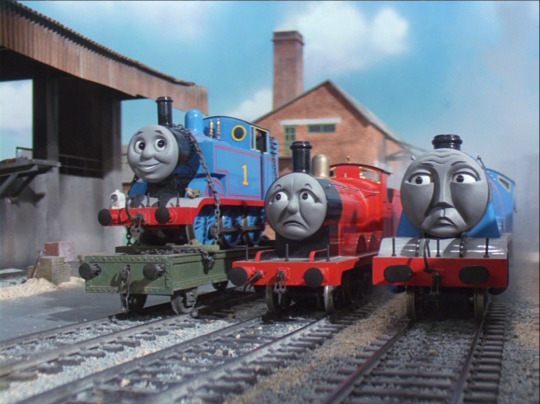
I once heard someone describe this as the quintessential Thomas episode, and I think that's not far off the mark. Yet another simple, enjoyable story, with an underlying message that's still especially relevant in these troubled times - however badly your day's going, things always have a way of working out alright in the end.
Plus, you know, that crash is pretty awesome...
Series 4 - Steam Roller
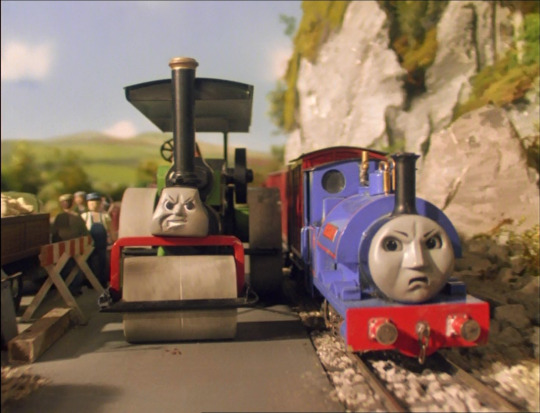
Another episode I remember vastly enjoying on VHS. And again, it has a simple premise that's executed brilliantly: When two identical personalities collide, the results can be interesting; when those same personalities are as full of themselves as each other, the results can be spectacular...
Series 5 - Toby's Discovery
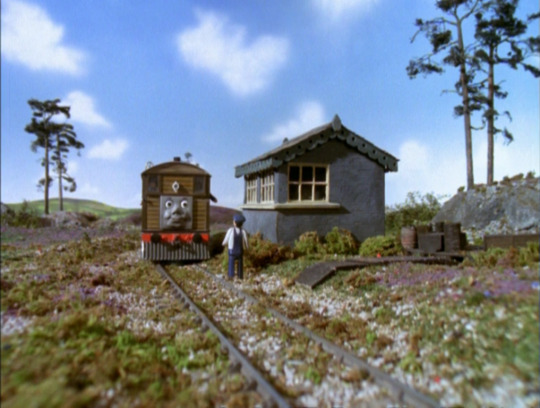
Anyone who knows me well knows just how much of a sucker I am for good worldbuilding, and that's one of the things that's kept me interested in Thomas all these years. This episode in particular sheds some light on Sodor's past, and there's some great set design and cinematography to support the story.
That, and Toby's one of my favourite characters, so this is bound to be one of my favourite episodes...
Series 6 - Percy's Chocolate Crunch
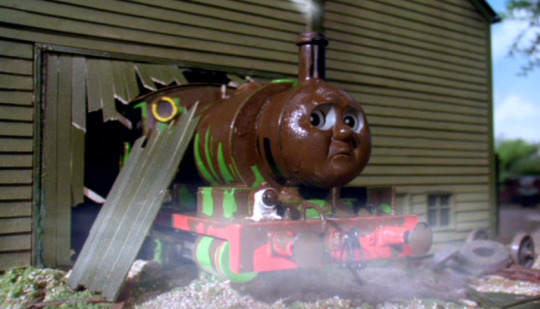
Again, I'm not really sure why this is my favourite episode from Series 6. I suspect I mainly like it for the crash; it's just so batshit-insane and ludicrous - even by the show's own standards - that I just can't help but love it. I also love the idea that the people of Sodor have apparently learned nothing from the events of stories like A Close Shave or Thomas Comes To Breakfast - what did Mr Jolly think was going to happen when he sited his chocolate factory at the end of a railway siding?
Series 7 - Peace & Quiet

I'll be honest, nothing in Series 7 really sticks out to me - this one only makes the cut because I remember really enjoying it as a kid. Murdoch's always been one of my favourite TV-exclusive characters, and that's probably because I identify so strongly with him - a big guy who doesn't say much, and just wants to go about his business in peace.
#thomas the tank engine#the railway series#sodor#island of sodor#series 1#series 2#series 3#series 4#series 5#series 6#series 7#favourite episodes
5 notes
·
View notes
Note
If you're still taking Tales of Arcadia prompts, how about Krel feeling homesick (can take place during or after 3Below)
Yes! I’m always accepting prompts(if I can’t work on them right away then I’ll get to them at some point) and I’m actively looking for ToA ideas right now because I recently watched Wizards and I’m rewatching 3Below. (This story is ignoring Wizards. I love it, but I needed Steve to be in Arcadia and more on par with his 3Below level of emotional competence)
Warnings: negative self talk, negative self image, mention/discussion of emotional abuse
I hope you like it! A bit of homesickness, a bit of ruminating on his place in the universe, a bit of general sadness and loneliness, and a bit of hurt/comfort!
~
Krel didn’t regret staying on Earth. He didn’t. He missed Akiridion-5 more than he could put into words but he didn’t regret staying. He could be something more than a royal here. He could learn who Krel was, without the responsibility to his people. They had Aja now. They didn’t need him.
He missed being needed. Krel built his entire personality around being useful. Aja is often missing important events? Krel will always be there early. Technology is needed to keep people safe and happy? Krel will learn to be the best engineer ever. People are panicking in a crisis? Krel will be there to help. But no one needed him anymore. Not on Earth and not on Akiridion. Aja has grown into the queen everyone always said she would and Krel has been quietly pushed out of the spotlight that had always been hers.
He missed Akiridion, but he didn’t really miss anyone on Akiridion. Of course he missed Varvatos and Aja, but they visited and there was no one else waiting for him there. Oh, the people liked him well enough as a royal, but none of them knew him personally. He had always been a figurehead, a placeholder for Queen Aja. The only people who had ever been interested in Krel, who had called him a friend, were here on Earth. No one cared about what he could do for them, they just liked him. Or didn’t. But that wasn’t the point.
The point was that Krel was lonely. He was lonely and frustrated because being lonely should be an issue. He had always been lonely. He knew how to be lonely. Why did it hurt so much more now? Was it possible to be so lonely that you miss at least being lonely somewhere familiar? Was he really so desperate that he was longing for a familiar place since he knew he couldn’t have familiar people?
Or was he ignoring the real reason he’d stayed on Earth? The fact that if he never went home, if he never saw the empty halls and rooms that Mama and Papa would never walk again, he could preserve the memory of Akiridion with them in it. If he never went home and saw that they weren’t there, he could pretend that they were there with Aja and Varvatos, just waiting for him to come home?
~
The house was quiet now. There were no crashing distractions, no loud voices, no disturbances whatsoever.
Krel hated it.
He kept calling for someone who would never answer. First it was Mother, then Aja, then Varvatos. Now he wasn’t even sure who he was calling for as the sound caught in his throat before he could even form a name.
He sighed, pushing back his chair and letting the holograms go dark. He had thought it would be better down here, where he had always wanted quiet and to be alone, but missing them didn’t stop just because logic said it should.
There was a knock on the door.
Krel wipes his eyes and made his way to the front door. He opened it a crack. Steve was standing on the doorstep, wringing his hands, looking at the ground, and muttering to himself. Krel didn’t bother to listen to what he was muttering.
“What?” Krel snapped.
“H-hey, Krel,” Steve stammered. “I was wondering if I could hang out here for a little while? I-I know she’s not here, but I thought maybe-”
Krel swing the door the rest of the way open. “Come on in,” he said, resigned. “I miss her too.”
Steve made his way inside and threw himself on the couch. “Aw, man, do you want to, like, talk about it or something?”
“No,” Krel snapped. “I do not want to “talk about it” with you.”
Steve sighed. “Hey, man, I know I’m not exactly your favorite person, but it’s not good to keep all your feelings all bottled up.”
“Who told you that?” Krel sneered, refusing to look at Steve. “The Pepperjack?”
Steve snorted. “No, my therapist, actually.” Krel turned around slowly to face Steve, who laughed. “I know! Big surprise! I used to see someone back when my mom and I first moved to Arcadia and I talked to Coach and my mom about going back recently. I’ve been to see her twice since Aja and Eli left.”
Krel stiffly walked over and sat on the couch as far away as he could from Steve. “What do you talk to this therapist about?”
“Did anyone ever tell you about me when I first moved to Arcadia?” Steve asked, seemingly apropos of nothing. Before Krel could respond, Steve cut in. “I swear I’m going somewhere with this!”
“No,” Krel said sharply. “I have not discussed you with anyone but my sister and even then as little as possible.”
Steve laughed. “Fair. No one really talks about it anymore. I don’t like to think about why.” He sighed. “I used to be really awful. Like beat the shit out of people and throw them in lockers awful. I’m lucky Eli even talks to me.”
“Did you do that to him?” Krel asked bluntly.
Steve winced. “Yeah. For a while. I was in a really bad place when we moved here. My dad was... bad.”
“Bad? At being a father? Like Ricky?” Krel asked.
“Ha!” Steve barked a laugh. “I wish. No, he used to scream at my mom and I until one of us cried. Or both. He never laid a hand on us, but sometimes...” he trailed off. “Sometimes I wished he would. At least if he actually hit me then I would have a reason to cry instead of just being a baby.”
“...I’m sorry.”
Steve shook his head. “Don’t worry about it. Anyway, my mom divorced him when I was in middle school. She took me and we moved across the country.”
“To Arcadia,” Krel guessed.
“Yeah,” Steve said. “Part of me was glad we were away from him but part of me wanted to go back. He was my dad and I still loved him. We left everything behind, our home, my dad, my friends.”
“Steve...”
“And then we were here,” Steve said as if Krel hadn’t said anything. “And I didn’t know anyone and I was scared that everyone would think I was weak for running away so I made sure no one could ever call me weak.” Steve sighed. “But I never really got over it. That fear that I’m too weak or not good enough and the fear that nothing good lasts. So when I lost my girlfriend and best friend in one day...”
“You wanted to talk to someone,” Krel surmised.
“Yeah,” Steve said, getting choked up. “I think you should see someone too. A professional.”
Krel huffed. “I will think about it.”
Steve rolled his eyes. “How about me for now, then? Tell me about Akiridion.”
Krel’s eyes lit up and for the first time in a long time, a real smile spread across his face. “Well, for starters, it is so much better than this mudball...”
#tales of arcadia#3below#tales of arcadia fic#krel tarron#steve palchuk#toa krel#toa steve#prince krel#3below krel#krel angst#steve angst#mentions of emotional abuse#tw negative self talk#i need a writing tag
46 notes
·
View notes
Text
Sci Babe via Facebook:
You take for granted that when you pee in a cup and send it off to a lab for analysis that the human beings there give a fuck about if the results they send back are going to mess up your life or not.
Well.
Today’s moment of science… tales from the field.
Aah, the piss lab. I used to work at a lab that analyzed drugs in urine and oral fluid. If you were drug tested for a job test, that’s not the type of business the company did. If you were in long term managed pain care or if you’d gone through rehab and were on a medication based treatment plan, our company was making money off of yo- uh, helping you stay sober.
Apropos of absolutely nothing, check out the Last Week Tonight episode called Rehab. John Oliver mentions that certain drug testing labs refer to urine as ‘liquid gold.’ I’m absolutely not mentioning this because I think it reflects the attitude of my former employers, especially not the now-defunct urinalysis lab allegedly accused of medicaid fraud.
Nope. That’s not it at all.
(Allegedly).
The process of testing someone for drugs started in their doctor’s office. There were proprietary urine cups from the company that provided a relatively quick and accurate reading for several types of drugs. When they arrived at the office, the cup would be taken to our screening lab and tested for the presence of a dozen or so groups of drugs. Then the cup would be put in cold storage and an aliquot would be sent over to my side of the lab where we’d find out exactly what had come back in the sample. The results from the screening lab were a useful guide in telling us if our readings were within an expected range.
There were fail-safes in place to stop inaccurate results from getting out. The instruments were well maintained and managed as a team. Results went through several layers of verification before being sent to doctors. Samples had barcodes and labels everywhere so that it would be damn near impossible to mix up one aliquot with one from another cup.
There was this one time though.
I happened to run confirmation testing on one patient’s sample for two different substances. I only noticed it because in both cases, they didn’t match the screen. Then I looked at all their results and none of them matched the screen or their previous drug history.
Not matching one of those, possible. Not matching anything, fucking weird.
I’d been at this lab for several years, and this was something new. There was absolutely no reason why someone couldn’t have mis-labeled an aliquot, it just hadn’t happened in all of my samples yet.
But then I walked into the certifying officer’s office, one of the fancy folks with a fancier degree who gave the final stamp of approval to all the results before they left the building. I showed them the problem, and the response? “Well this can happen.” I was surprised that they didn’t mean a mis-poured test tube. They meant that somehow, it was possible for six highly positive drug screens and all negative confirmation tests. Then came rationalization after rationalization why every single test result didn’t match the screen.
Because it was better to rationalize that than possibly accept that you have to delay releasing your results by four more days to re-test everything.
It’s true, some substances can trip a false positive screen for other drugs, which is a big reason why the confirmation tests are so important. More than one false positive would strain credulity. Six? Fuck you and the GC/MS you did this analysis on.
After a short deliberation, I got the cup out of the freezer. Of course the cup matched the screen and the patient records and not whatever bullshit I’d been handed at first.
I was able to get the patient re-tested for the two tests I’d personally overseen. The other four tests were not re-run.
The lab went out of business a few years ago. Couldn’t have happened to better people.
If you ever test positive for a drug that you absolutely, positively, beyond a shadow of a doubt know that you didn’t take and there’s no reason you should have tested positive for it? You might be in for a difficult conversation with your doctor. Request a re-test from the original cup. It can eliminate possible contamination or a sample switch.
And if that doesn’t work? You absolutely shouldn’t, but you can always keep calling the lab director with knock knock jokes until they reconsider their life decisions.
This has been your daily Moment of Science, not so fondly remembering the days of working nearly 70 hours a week with the promise of maybe a raise or a promotion next year.
-
3 notes
·
View notes